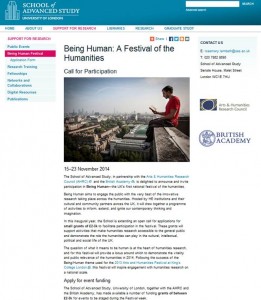After completing my homework, I arrived for day two of Grants Academy ready to watch my ‘one page proposal’ get ripped apart. Day one provided a new bag of tricks and background knowledge on funding bodies and their remits. Yet, rather than feeling more confident, I seemed to have developed a sudden outbreak of academic imposture syndrome. Taking a seat around our workshop table, I quickly realised I wasn’t alone. It seemed most of us participating in the Academy went home for a round of self-doubt: Did our research really have any benefits? Were there enough people in our research networks? Do any of us actually have the skills (or time!) to coordinate a major research project?
Day two’s session was focused on locating benefits and articulating impact. Facilitator Martin Pickard once again dove right into the murky grant-writing world: The days of academic freedom are long gone. The only way to win funding is to wade into the dark waters and train for competition.
Our first job of the day was to learn how to uncover and articulate the outward-facing values of our research. While many of us in the Social Sciences, Arts and Humanities fear that impact must be financial, Martin showed us RCUK’s list of possible beneficiaries and impacts to diversify our thinking. These include the environment, health, society and citizenship among others. While all bids must clearly identify impacts to beneficiaries, our job is to ‘potentially impact,’ not to promise world change. Most of our research is making a minor contribution to a bigger problem. The task then is to make a strong case for the minor contributions we make.
To examine how an impact agenda reshapes the ways we present our projects, we workshopped Dr. Hywel Dix’s research proposal. Hywel and his collaborators are bidding for a BA/Leverhulme Small Research Grant for a pilot study. Their research plan proposes to re-evaluate the tacit assumptions that work produced by contemporary authors late in their career is of inferior quality to their earlier work.
Martin put Hywel on the hot seat, asking him to identify impacts and beneficiaries. At first it seemed difficult to think about this English literature project through the business-oriented language of impact agendas. But through collaborative brainstorming we came up with concrete ways groups of people would potentially benefit from Hywel and his team’s research:
Beneficiaries – Re-evaluating Literary Production in Later Life
- Academic: scholars in literary studies
- Cultural sector: contributes a new evaluative framework for making aesthetic judgement around authors work (i.e. impact prize competitions, Arts Council grants)
- Students/Teachers: inform ways canonical literature is selected for curriculum and testing
- People in later life: placing value on these literary productions has the potential to impact people in later life with dementia and Alzheimer’s as writing and reading improves health and wellbeing
After lunch it was time for the dreaded peer reviews of our ‘one page proposal’ homework. Working in the silos of our own departments, on a day-to-day basis we rarely exchange ideas with colleagues across schools. As Communication Scholars read a Computer Science bid and a Business researchers evaluated a Social Work proposal, we realised what it takes to write clearly and convincingly outside our comfort zones. Having seven pairs of interdisciplinary eyes on each of our proposals was terrifying but invaluable. The peer review highlighted the importance of Martin’s advice to give reviewers exactly what they want to see. Use the remit and criteria to structure your arguments so a reviewer does not need to search through the document with a fine tooth comb to find key elements.
The peer review also pushed us to explain the basic tenants of our research. We easily come to take the big picture of our research for granted, when this is often what actually needs the most justification in our proposals. We are accustomed to disciplinary conferences and peer review journals where we argue the fine points of theory, method and approach. While this does belong in the application to show rigour and expertise, without a clear case for why our research matters, we can’t win.
Anna Feigenbaum is a Lecturer in the Media School. As part of her CEMP Fellowship she is creating a diary of her time at the Grants Academy. You can read here Day One Diary post here.


























 Beyond Academia: Exploring Career Options for Early Career Researchers – Online Workshop
Beyond Academia: Exploring Career Options for Early Career Researchers – Online Workshop UKCGE Recognised Research Supervision Programme: Deadline Approaching
UKCGE Recognised Research Supervision Programme: Deadline Approaching SPROUT: From Sustainable Research to Sustainable Research Lives
SPROUT: From Sustainable Research to Sustainable Research Lives BRIAN upgrade and new look
BRIAN upgrade and new look Seeing the fruits of your labour in Bangladesh
Seeing the fruits of your labour in Bangladesh ECR Funding Open Call: Research Culture & Community Grant – Apply now
ECR Funding Open Call: Research Culture & Community Grant – Apply now ECR Funding Open Call: Research Culture & Community Grant – Application Deadline Friday 12 December
ECR Funding Open Call: Research Culture & Community Grant – Application Deadline Friday 12 December MSCA Postdoctoral Fellowships 2025 Call
MSCA Postdoctoral Fellowships 2025 Call ERC Advanced Grant 2025 Webinar
ERC Advanced Grant 2025 Webinar Update on UKRO services
Update on UKRO services European research project exploring use of ‘virtual twins’ to better manage metabolic associated fatty liver disease
European research project exploring use of ‘virtual twins’ to better manage metabolic associated fatty liver disease